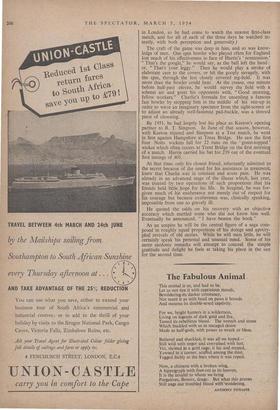SPOUTING ASPECT
Charlie
By JOHN ARLOTT THE county cricket captains, at their annual meeting, included, as a new appointment' in their list of umpires to stand in first-class matches in 1954, the name of C. B. Harris (Nottinghamshire). In many autograph albums he is represented by the page-wide and unmistakable signature ' Charles Bowmar Harris' underlined with a fine old-fashioned flourish; but a full generation of county cricketers has iden- tified him satisfactorily as ' Charlie.'
He will have his place in the sun, this summer, for the second time : and, for the second time, he will have it in defiance of probability.
Many great players have come to the summer-long green fields of first-class cricket from the pit-head pitches which dot the Nottinghamshire and Derbyshire coalfield, but they have been only a small proportion chosen from the thousands who have played there. Charles Harris, of Underwood, was seven- teen when he left the pit, packed his new leather bag, and, prepared to stand on his own feet, went to join the Notting- hamshire ground staff. It was 1925 and the feudal order of things still ruled at Trent Bridge. G. Gunn, W. Whysall, W. Walker, A. W. Carr, W. Payton was the order of the side's main batting. Notts were in one of their periods of plenty. The young men could think themselves lucky to be alive and there in such a time.
The figures of Charles Harris's cricket career are those of a good, workmanlike county batsman. He first played county cricket in 1928; was given his county cap in 1931, and retired in 1951. He scored something over eighteen thousand runs for Nottinghamshire. Meanwhile, with greater pleasure, if less technical justification, he took one hundred and ninety-six wickets with off-breaks which did not always break but had the backing of tactical conversation.
On those pitches near the pitheads, where the black coal shows through the grass blades, batsmen learn not to flinch when the ball rears at their ribs; neither do they rub their bruises, for that, they know, merely encourages the bowler. Charlie always batted the more determinedly for being hit.
In the long-enduring Nottinghamshire opening pair of Keeton and Harris, Keeton was the heavier scorer, a brilliant stroke Maker who, in his time, went in first for England. Yet many bowlers found it harder to bowl to Harris. in London, so he had come to watch the nearest first-class match, and for all of each of the three days he watched in- tently, with both perception and generosity.) The craft of the game was deep in him, and so was know- ledge of men. One spin bowler who played often for England lost much of his effectiveness in face of Harris's `nomination.' " That's the google," he would say, as the ball left the hand : or, " That's your leggy." Then he would play a. stroke of elaborate care to the covers, or hit the googly savagely, with the spin, through the less closely covered leg-field. It was more than the bowler could bear. At the crease, one minute before half-past eleven, he ' would survey the field with a solemn air and greet his opponents with, " Good morning, fellow workers." Charlie's formula for unsettling a famous fast bowler by stopping him in the middle of his run-up in order to wave an imaginary spectator from the sight-screen or to adjust an already well-fastened pad-buckle, was a shrewd piece of clowning.
By 1951, he had largely lost his place as Keeton's opening partner to R. T. Simpson. In June of that season, however, with Keeton, injured and Simpson at a Test, match, he went in first against Hampshire at Trent Bridge. He saw the first four Notts wickets fall for 22 runs on the ' green-topped ' wicket which often occurs at Trent Bridge on the first morning of a match. Harris carried his bat for 239 out of the eventual first innings of 401.
At that time, only his closest friend, reluctantly admitted to the secret because of the need for his assistance in treatment, knew that Charlie was in constant and acute pain. He was already in an advanced stage of the illness which, last year, was treated by two operations of such proportions that his friends held little hope for his life. In hospital, he was for- given much of his exuberance not merely out of respect for his courage but because exuberance was, clinically speaking, impossible from one so gravely ill.
He quoted the odds on his recovery with an objective accuracy which startled some who did not know him well. Eventually he announced, " I have beaten the book."
As an umpire he will be the central figure of a saga com- posed in roughly equal proportions of his doings and apodry- phal revivals of old stories. While he will miss little, he will certainly speak his personal and unusual mind. Some of his more sardonic remarks will attempt to conceal the simple gratitude and delight he feels at taking his place in the sun for the second time.



































 Previous page
Previous page